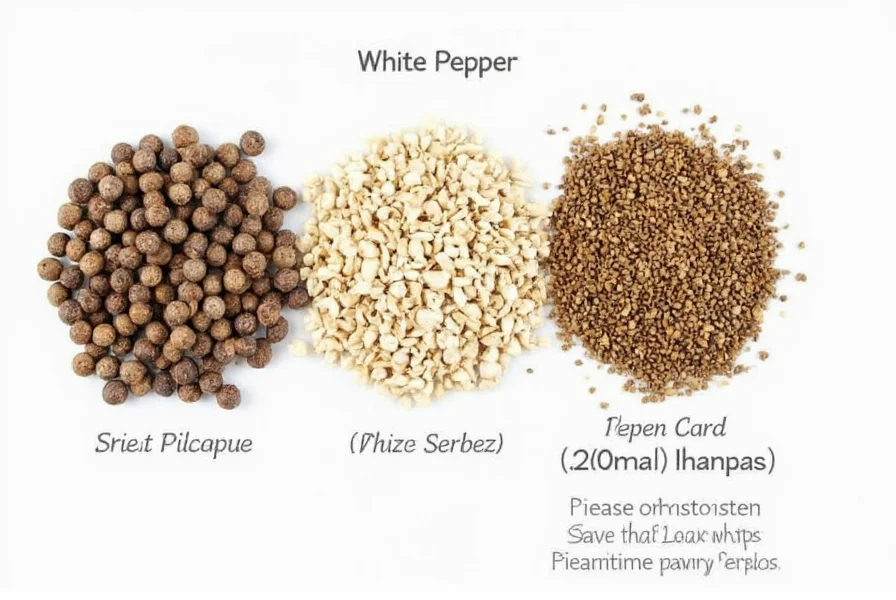Unlike its more common counterpart, white pepper undergoes a different processing method that affects both its appearance and culinary applications. This distinctive spice has been used for centuries in various cuisines worldwide, particularly where a milder pepper flavor or cleaner visual presentation is desired.
The Production Process of White Pepper
White pepper begins as the same fruit that produces black pepper—the berry of the Piper nigrum vine. The key difference lies in the processing method. While black pepper uses unripe green berries dried with their outer layer intact, white pepper comes from fully ripe berries.
Producers soak the ripe berries in water for about a week, a process called retting, which softens and removes the dark outer layer (pericarp). What remains is the seed inside, which is then dried to create white pepper. This additional processing step explains why white pepper typically costs more than black pepper.

White Pepper vs Black Pepper: Key Differences
Understanding the difference between white pepper and black pepper is essential for proper culinary application. While both come from the same plant, their processing creates distinct characteristics.
| Characteristic | White Pepper | Black Pepper |
|---|---|---|
| Processing Method | Ripe berries with outer layer removed before drying | Unripe berries dried with outer layer intact |
| Flavor Profile | Milder, earthier, less complex | Sharper, more complex, floral notes |
| Aroma | Subtle, less pungent | Strong, distinctive |
| Appearance in Dishes | Blends in, no visible specks | Creates visible black specks |
| Common Culinary Uses | Light-colored sauces, mashed potatoes, cream soups | Most savory dishes, visible seasoning |
Culinary Applications of White Pepper
Chefs often choose white pepper when they want pepper flavor without the visual distraction of black specks. This makes it ideal for:
- Light-colored sauces and soups where appearance matters
- Mashed potatoes and other white purees
- Mayonnaise-based dressings and sauces
- Traditional Chinese cuisine, particularly in delicate dishes
- French cuisine, especially in classic béchamel sauce
When substituting white pepper for black pepper in recipes, use slightly less white pepper as its flavor can become overpowering when heated for extended periods. The white pepper uses in cooking differ primarily based on visual considerations rather than dramatic flavor differences.
Nutritional Profile and Potential Health Benefits
White pepper contains piperine, the same active compound found in black pepper, though in slightly lower concentrations due to the removal of the outer layer. This compound may offer several potential health benefits:
- May enhance nutrient absorption, particularly of curcumin in turmeric
- Contains antioxidants that combat oxidative stress
- Potential anti-inflammatory properties
- May support digestive health by stimulating enzyme production
While research on white pepper specifically is limited compared to black pepper, the white pepper nutritional value shares many similarities with its darker counterpart. Both provide trace amounts of vitamins and minerals including potassium, iron, and magnesium.
Proper Storage and Shelf Life
To maintain optimal flavor, store white pepper in an airtight container away from light, heat, and moisture. Whole white peppercorns retain their potency longer than pre-ground versions—typically 2-3 years compared to 6-12 months for ground pepper.
For maximum flavor impact, consider grinding white peppercorns just before use. Many chefs keep both white and black peppercorns in their grinders, selecting based on the specific dish they're preparing rather than relying solely on pre-ground versions.

When to Choose White Pepper Over Black Pepper
The decision to use white pepper instead of black comes down to both visual and flavor considerations. While black pepper offers a more complex flavor profile with floral and citrus notes, white pepper provides a cleaner, more direct heat that some chefs prefer in certain applications.
Understanding why use white pepper instead of black can elevate your cooking. In delicate dishes like béchamel sauce, white pepper maintains the pristine white appearance while still providing necessary seasoning. In some Asian cuisines, white pepper's earthier notes complement traditional flavor profiles better than black pepper's sharper profile.
Frequently Asked Questions
Is white pepper just bleached black pepper?
No, white pepper is not bleached black pepper. It's made from fully ripe peppercorns with the outer layer removed through natural fermentation and washing, not chemical bleaching. The lighter color comes from removing the dark outer layer rather than any bleaching process.
Can I substitute white pepper for black pepper in recipes?
Yes, you can substitute white pepper for black pepper, but with some considerations. Use about 25% less white pepper as its flavor can become more pronounced when cooked. The substitution works best in light-colored dishes where black specks would be undesirable, but note that the flavor profile will be slightly different—milder and earthier with white pepper.
Does white pepper have the same health benefits as black pepper?
White pepper contains similar compounds to black pepper but in different concentrations. Both contain piperine, though black pepper has higher concentrations since piperine is concentrated in the outer layer that's removed to make white pepper. Both offer potential antioxidant and anti-inflammatory benefits, but black pepper generally has more research supporting its health properties.
Why do some recipes specifically call for white pepper?
Recipes call for white pepper primarily for visual reasons in light-colored dishes like cream sauces, mashed potatoes, or white sauces where black specks would be undesirable. Some traditional recipes, particularly in French and Chinese cuisines, specify white pepper for its distinct earthier flavor profile that complements certain ingredients better than black pepper.
Is white pepper spicier than black pepper?
White pepper is not necessarily spicier, but it has a different heat profile. Many people perceive white pepper as having a more direct, upfront heat that lingers, while black pepper offers a more complex heat with floral and citrus notes. The actual capsaicin content (which creates heat) is similar, but the flavor compounds differ due to the processing methods.











 浙公网安备
33010002000092号
浙公网安备
33010002000092号 浙B2-20120091-4
浙B2-20120091-4